French election: Far-right Le Pen's long quest for power in France
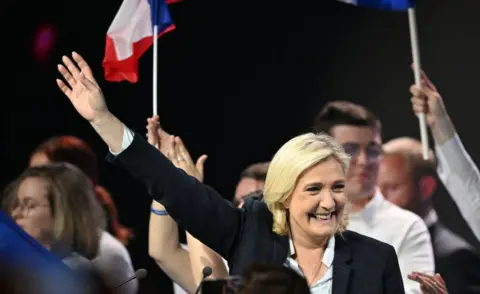 Getty Images
Getty ImagesMarine Le Pen has been on a journey, taking France's far right to within touching distance of the presidency.
Even after she took over the leadership of her father's National Front in 2011, she spent years trying to reach the point of dédiabolisation (de-demonisation) considered necessary to turn an extremist force into a party that believes it is on the verge of power.
Her policies on immigration and prioritising homes and jobs for French nationals are still far-right, but the woman who leads the revamped Rassemblement National, or National Rally, conveys a moderate, approachable image of populism.
"Yes I'm a professional cat-breeder, I'm a farmer in some way," she told high-brow broadcaster France Inter in January. Le Pen has six cats and they feature on her TikTok videos and even a special private Instagram account.
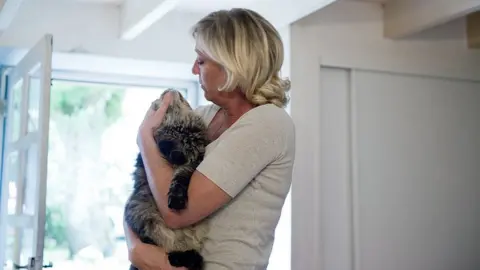 MARTIN BUREAU/AFP/Getty Images
MARTIN BUREAU/AFP/Getty ImagesWhen political scientist Chloé Morin asked a panel of voters in Lille last year what was their image of her, it was the cats that stood out. Who wouldn't trust a cat lady, after all?
She may sound more moderate but the policies she embraces are no less radical than before on immigration, nationality and Islam. Emmanuel Macron says her programme is racist.
Gone are the racist and anti-Semitic references, says James Shields, professor of French studies at the University of Warwick. But the old anti-immigrant and authoritarian law-and-order measures of her father's old party are largely unaltered.
Le Pen goes into Sunday's run-off vote against Emmanuel Macron only a few points behind in the polls, and after an assured display in their televised debate.
How different a story from five years ago when she was underprepared, outmanoeuvred and flustered during the set-piece TV duel ahead of an election in which Macron won two-thirds of the vote.
A family drama
And yet she already fared better than her father, Jean-Marie Le Pen, who made it to the run-off in 2002 on an anti-immigrant, law-and-order platform. He was trounced because 82% of voters rejected his policies as toxic.
This was a man who has repeatedly, ever since 1987, spoken of the Nazi gas chambers and the Holocaust as "a detail of the history of the Second World War" and who has been widely accused of anti-Semitism.
Her campaign nowadays features the slogans Marine Présidente and "For all French people". There isn't a hint of the Le Pen name; the cleansing of the brand is almost complete.
She was eight years old when she first realised who her father was, surviving a 1976 bombing that badly damaged the Le Pen family apartment in central Paris.
 AFP
AFPShe described in her autobiography how she and her two older sisters "were on our knees shivering, holding hands... when we heard the voice of our father shouting, 'Girls, girls, are you alive?'"
Afterwards her schoolfriends were told not to go near her: "A cordon sanitaire was created around us - don't go near the Le Pens."
Then when she was 16, her mother Pierette ran off with her father's biographer. For a teenage Marine it was a traumatic moment that brought her closer to her father.
"For a month and a half I vomited every day. I was incapable of feeding myself," she wrote in her 2011 autobiography.
Those formative years gave her the hard exterior she is fabled for. The grin she flashes for photographers rarely lasts.
"After everything she went through in her youth, she built herself a shell," her friend Steeve Briois told the BBC. He remains a staunch ally, as mayor in her heartland of Hénin-Beaumont in northern France.
Lawyer for illegal immigrants
Graduating as a lawyer at one of the top Paris law schools in the early 1990s, she went on to act for defendants who could not afford a lawyer. That would sometimes involve illegal immigrants. Asked about it later she said she saw no contradiction at all: "They're human beings, they have rights, you're not going to blame them for immigration policy."
"I admired how she kept her cool and was able to maintain normal professional relationships despite being burdened with the notoriety of her father," Paris barrister Basile Ader told the BBC.
By 1998, her career wasn't flourishing. It didn't help that she was boycotted by other lawyers because of her father's politics.
So after six years she left the bar for the top job in the National Front's legal department.
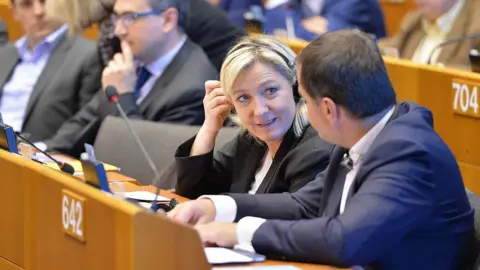 Getty Images
Getty ImagesThere were grumblings of nepotism but by 2004 she was elected to the European Parliament and remained there for 13 years.
Breaking with her father
Even before she replaced her father as National Front leader, it was clear she had misgivings about some of his more unpalatable ideas about Nazi history.
When in 2005 Jean-Marie Le Pen told a far-right magazine that the German occupation of France was "not so inhuman, even if there were some stains", she considered standing down as his deputy. Her adviser Bruno Bilde believed that deep down she even contemplated leaving politics.
Her father's fate was sealed when he only secured 10% of the vote in 2007 and within four years Marine Le Pen was in charge.
While campaigning to be elected leader, the future face of the National Front was stoking outrage in her own right. She told supporters in Lyon that the sight of Muslims praying in the street was similar to the Nazi occupation. First came "more and more veils", then "more and more burkas". Now there were no tanks or soldiers "but it is still an occupation, and it weighs on people".
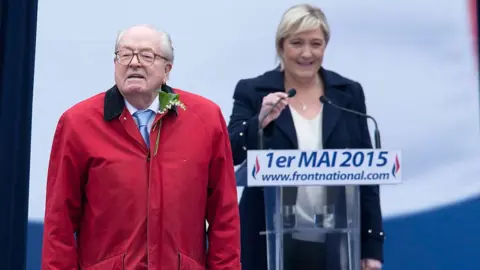 Aurelien Meunier/Getty Images
Aurelien Meunier/Getty Images"Far right with a human face" was how French philosopher Bernard-Henri Lévy described her at the time. She was eventually cleared of inciting hate.
She then sought to get rid of some of the older generation of Le Pen supporters, many of whom shared a sympathetic view of the Vichy regime that collaborated with the Nazis in World War Two.
But financing a far-right party was still toxic in France and she went cap in hand to Russia for €11m (£9m) in loans in the same year Vladimir Putin staged a land-grab in Ukraine. She even threw her support behind the Kremlin's sham of an annexation vote in Crimea.
Le Pen focused on perceived threats against French life: "Islamification", globalisation, the EU and the euro. She came a creditable third in the 2012 presidential election.
By 2017, the National Front was run by slick young professionals running YouTube channels and attracting support across France. The party had chalked up wins in local, European and regional elections and claimed Jewish and Muslim supporters.
Although she was well beaten by Emmanuel Macron in the presidential run-off, she had nevertheless attracted 7.7 million votes.

Race for the French Presidency
- SCHOFIELD: No walkover now
- TWO VISIONS: Macron v Le Pen
- EU: Trepidation in Brussels over Le Pen
- GUIDE: How vote works

Has she detoxified the far right?
Five years on, she can claim to have made the brand even more electable, with the softer National Rally name and the offer of a down-to-Earth alternative to a president accused of being out of touch with ordinary people.
"I'll run the country like a mother - without extravagance and with common sense," she promises voters while on walkabout in a market. And when the number one election issue is the soaring cost of living, she has based much of her campaign around it. People can't afford to run a car: she gets it.
"National Rally's programme, like that of the National Front before it, is still centred on the key principle of priorité nationale, priority for French nationals in jobs, social housing, welfare benefits and health care," says Prof James Shields.
Le Pen may no longer advocate leaving the EU, but her programme would put France on a collision course that would end in de facto withdrawal, he believes.
For French Muslims, her proposal to ban the headscarf in public is most worrying.
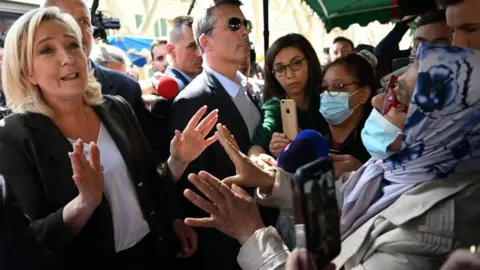 Getty Images
Getty ImagesWhen a retired woman in a headscarf appealed to her last week to leave Muslims alone, Le Pen argued that in some neighbourhoods women felt compelled to wear the veil so as not to be judged.
The woman, called Fatima, explained that she only started wearing one when she was older, to emphasise she was a grandmother.
Le Pen is accused by her rival of only campaigning in areas where she is popular. But when protesters shouted "fascist" and told her to leave, she did her best to keep smiling, claiming that the more fierce the response the greater her chance of winning the election.
If she were to win, her father Jean-Marie Le Pen would clearly be proud. But she continues to stress the "thousand" differences between them.
"He was the president of a movement that was originally a protest movement then an opposition movement," she explained. "I've organised my teams' work so we can get [into government] and put our ideas into practice".
